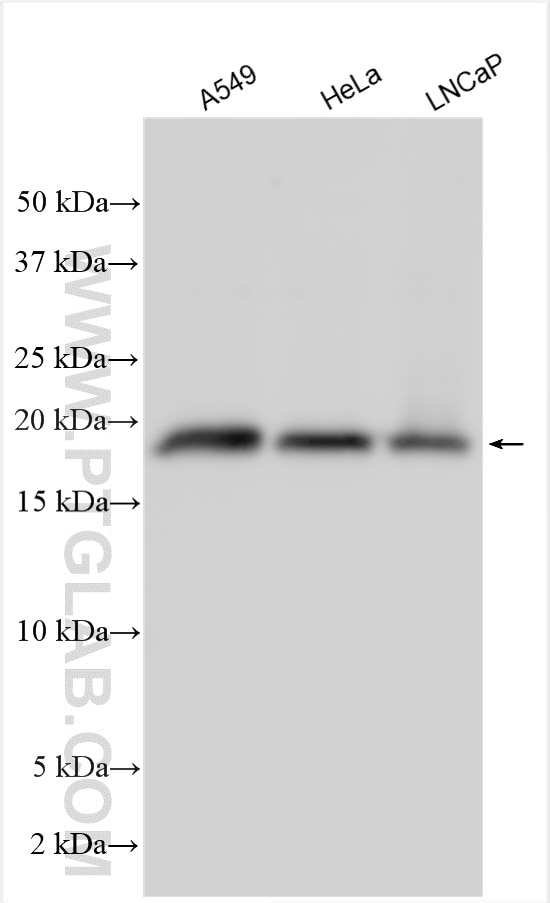Tested Applications
| Positive WB detected in | A549 cells, HeLa cells, LNCaP cells |
Recommended dilution
| Application | Dilution |
|---|---|
| Western Blot (WB) | WB : 1:500-1:1000 |
| It is recommended that this reagent should be titrated in each testing system to obtain optimal results. | |
| Sample-dependent, Check data in validation data gallery. | |
Product Information
13146-1-AP targets POP5 in WB, ELISA applications and shows reactivity with human samples.
| Tested Reactivity | human |
| Host / Isotype | Rabbit / IgG |
| Class | Polyclonal |
| Type | Antibody |
| Immunogen | POP5 fusion protein Ag3710 Predict reactive species |
| Full Name | processing of precursor 5, ribonuclease P/MRP subunit (S. cerevisiae) |
| Calculated Molecular Weight | 163 aa, 19 kDa |
| Observed Molecular Weight | 19 kDa |
| GenBank Accession Number | BC012505 |
| Gene Symbol | POP5 |
| Gene ID (NCBI) | 51367 |
| RRID | AB_3669153 |
| Conjugate | Unconjugated |
| Form | Liquid |
| Purification Method | Antigen affinity purification |
| UNIPROT ID | Q969H6 |
| Storage Buffer | PBS with 0.02% sodium azide and 50% glycerol , pH 7.3 |
| Storage Conditions | Store at -20°C. Stable for one year after shipment. Aliquoting is unnecessary for -20oC storage. 20ul sizes contain 0.1% BSA. |
Background Information
POP5 is a component of ribonuclease P and MRP ribonuclease complex that cleaves pre-rRNA sequences and generates mature tRNA molecules. Endogenous hPop5 protein is localized in the nucleus and accumulates in the nucleolus, which is consistent with its association with RNase MRP and RNase P. The human Pop5 cDNA encodes a protein of 163 amino acids with a predicted molecular mass of 18.8 kDa (PMID: 11413139).
Protocols
| Product Specific Protocols | |
|---|---|
| WB protocol for POP5 antibody 13146-1-AP | Download protocol |
| Standard Protocols | |
|---|---|
| Click here to view our Standard Protocols |



